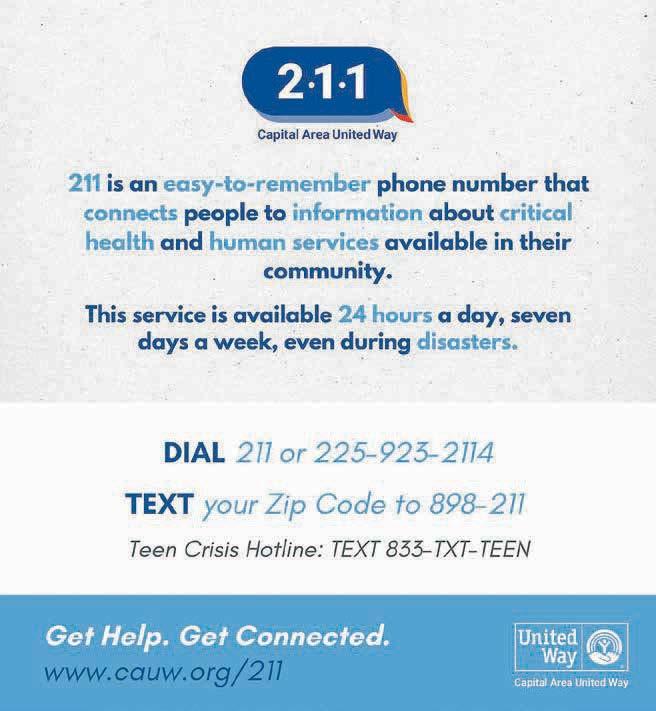
3 minute read
Catching schizophrenia early might save patients from a lifetime of illness
By Leslie Cardé | Contributing Writer
His name was Barry, and police found him standing on the roof of a 20-story building, ready to fling himself into the air, believing he was Superman and that he could fly. He was 22 years old, and voices in his head were telling him to jump.
When 25-year-old John Hinckley shot then-President Ronald Reagan in 1981, he was trying to impress Jodie Foster, an actress he’d never met but was obsessed with. He spent 34 years in a psychiatric facility after being found not guilty by reason of insanity.
Both men had a severe mental illness called schizophrenia, which can cause psychotic episodes consisting of hallucinations, delusions, paranoia and disordered thinking. Although most schizophrenics are not violent, they can act unpredictably at times, especially if they aren’t being treated.
“Everything about them looks normal, yet their brains are misfiring,” said Kathleen Crapanzano, M.D., associate professor of clinical psychiatry at LSU Baton Rouge. “The diagnosis of schizophrenia is a clinical one based on the symptoms. There is no blood test for this disease. For the most part, the brain is out of touch with reality. Patients can be convinced the sky is orange, and nothing you tell them will dissuade them.”
Disabling symptoms
Psychosis is not the only symptom of schizophrenia. According to Crapanzano, just as disturbing and often more disabling are symptoms such as complete apathy and an inability to experience pleasure.
Cognitive issues can also be problematic, like problems with attention, concentration and memory. Three-step commands can be hard to follow. Alongside schizophrenia, patients can also have depression.
Most schizophrenics are diagnosed in their late teens or early twenties, when they have their first psychotic break. One third of patients will spontaneously get better. One third will stay the same. One third will get worse.
There is no single gene associated with schizophrenia, but it does run in families. The risk to the general population is only 1%, but when one parent has the disease, the risk jumps to 10%. With two parents, it’s 50%. Even so, there are other factors.
“Life experiences can contribute as well," said Crapanzano, who’s treated those with schizophrenia for more than 20 years. "It’s a matrix of sorts. Was there
Early Intervention Clinic
There’s a movement afoot to get patients into treatment as soon as symptoms first appear. And now there’s a clinic in New Orleans that specializes in early intervention for those first experiencing psychosis.
Called EPIC, for Early Psychosis Intervention Clinic, it was co-founded by Ashley Weiss, M.D., who met a patient in the E.R. during her residency who was having his first psychotic episode. Weiss took him under her wing.

“It was post-Katrina, and this guy was in his early 20s and having delusional experiences,” remembered Weiss, who is an associate professor in psychiatry at Tulane.
“Word spread that I was seeing these patients, and I began to get referrals from hospitals and E.R.s," she said. "But I knew the key was to catch this disease in its infancy. Once you’re sick for 3-plus years, you don’t do as well. Repeated bouts of psychosis cause brain insults, which begin to affect cognitive abilities. Then, there’s everything this disease leads to in life: loss of jobs, problems with family, being shunned by society.”
Clearly, it’s better to nip it in the bud. But how? The educational arm of EPIC is CALM, (Clear Answers to Louisiana Mental health). It’s an outreach program that educates not just the public, but health professionals to the importance of treating disorders with psychosis early in the game. Considering that the average patient child abuse or neglect early on?
In prisons, long-term solitary confinement causes psychosis.” doesn’t seek treatment until they’ve had psychotic episodes for 72 weeks, it’s a tall order.
The disease is treatable, but it requires, in most cases, lifelong medication. And the medications have an array of side effects, ranging from Parkinsonian-like symptoms (tremors), and tardive dyskinesia (repetitive involuntary movements) to metabolic problems like high cholesterol and diabetes.
As most psychiatrists will tell you, it’s difficult to get a person who believes he’s thinking rationally to voluntarily take drugs with so many side effects. Compliance with meds is a major problem as a result.
We now know that getting proper treatment early on, and if possible after the first psychotic episode occurs, can be the first step to help patients lead the most normal life possible.
“We’ve taken out bus ads, and we’re getting people to talk about this illness, to de-stigmatize it,” Weiss said. "We had a fundraiser recently called 'In My Mind,' where patients came and talked about their hallucinations. It was eye-opening for a lot of people.”
At the moment, the task is to expand across Louisiana with a network of clinics like those in New York, California, Oregon and Ohio. The goal is to keep people out of the hospital.
“Most people with schizophrenia do not have to be institutionalized for the rest of their lives,” Weiss said.
“Yet the state facilities are full of people who never had the opportunity to get well. Many of the patients are still stuck in the story of their first episode of psychosis, when life began not to make sense anymore. We want to get past that.”
If you or someone you know may need help, you can call the EPIC clinic at (504) 988-0301, or email them at calm@tulane.edu. If you are wondering if you might need help, there is a quiz on their website at calmnola.org
--- Leslie Cardé













